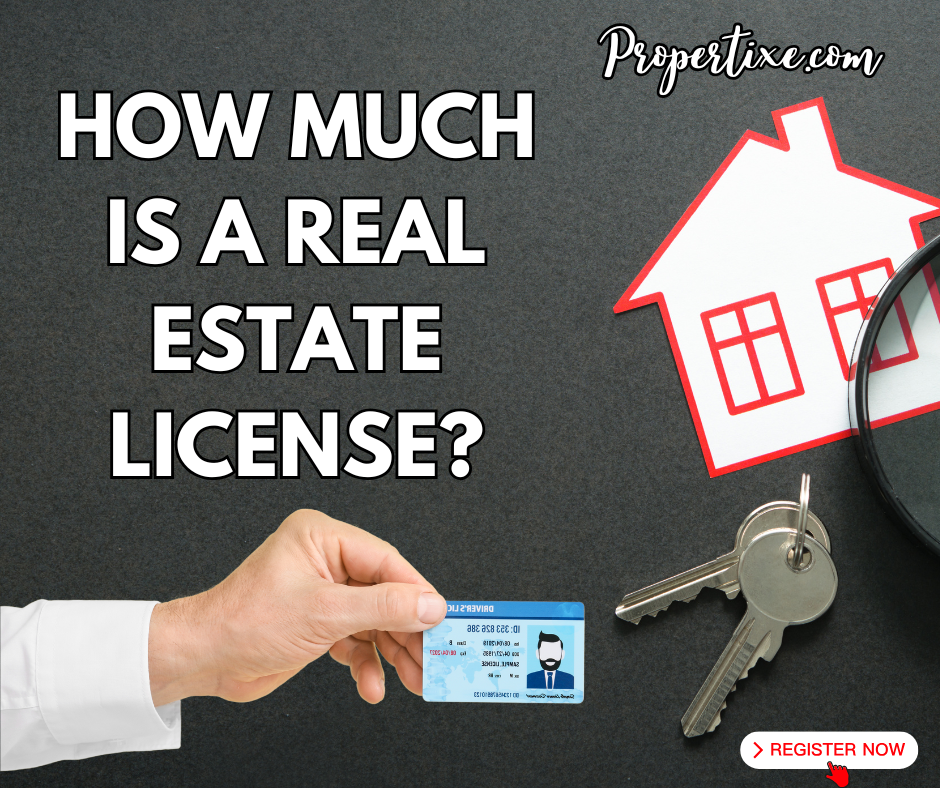Introduction
Beginning a career in real estate is exciting and fulfilling. One of the first questions often asked when starting is, How much is a real estate license? Understanding these financial requirements will enable you to plan more strategically as part of your journey.
From pre-licensing courses and examination fees to state licensing fees and ongoing expenses, the costs involved with getting your real estate license vary significantly based on location and individual circumstance. Here I’ll outline all these expenses along with sharing personal experiences as well as giving practical insights about what awaits you along this path.

The Process of Getting a Real Estate License
Costing of Real Estate License consists of multiple steps with associated expenses. Here is an outline:
- Pre-Licensing Education: Most states mandate pre-licensing coursework of 40-182 hours before you are eligible to sit the licensable exams, with costs typically ranging between $200-1000 depending on both provider and state regulations.
- Exam Fee: Once your coursework has been completed, the next step in becoming licensed in your state will be taking and passing an examination fee that typically ranges between $50 to $100.
- License Application Fee: Once you pass your exam, applying for your license requires paying a state-specific application fee which typically ranges between $50-400.
- Background Check and Fingerprinting: Some states mandate background checks that can cost $50-100.
- Errors and Omissions Insurance: Errors and Omissions insurance is often mandatory and costs between $200 to $500 annually.
- Continued Education: For license maintenance purposes, ongoing educational costs typically range between $50 and $300 annually.
Initial licensing expenses typically run anywhere from $500 to $2,000, plus ongoing maintenance expenses. Now let’s look more closely at each expense and how we can plan effectively for them.
1. Pre-Licensing Education: Your First Investment
Pre-licensing education is mandatory and serves as the cornerstone of your real estate career. States vary in requirements; with some necessitating as little as 40 hours and up to 180 in coursework requirements.
California requires 135 hours of pre-licensing education at an estimated cost of $250 to $600; Texas mandates 180 hours, typically costing $400-1,000.
As I began my education journey, I chose an online course because they were both more cost-effective and accommodating to my schedule. While this meant I wasn’t exposed to class interaction directly, the savings alone more than made up for any losses due to absence.
2. Exam Fee: Testing Your Knowledge
Exams for real estate licensing can be an expensive step and require fees between $50-100; states such as Florida charge $36.75, while California requires $60.
I remember feeling anxious about paying the exam fee not because of its cost, but because it felt like an investment into this career path. Knowing I had spent money made me work harder on studying for and taking more seriously the exam itself.

3. Licensing Fees: Securing Your Credentials
Once you pass an examination, it will be necessary to apply for your license in your respective state; application fees vary considerably. Some states charge as little as $50 while in others as much as $400 can be levied against.
Florida and Texas both charge an application fee of $83.75, while additional expenses such as background checks may also be factored into their application fee or charged separately.
Step five was exciting , it marked the culmination of all my hard work. Even though fees add up quickly, submitting my application helped it all come alive!
4. Background Check and Fingerprinting: Mandatory Security Measures
Essential Security Measures: Adding another level of protection.
Background checks and fingerprinting are mandatory requirements of new licensees. Costs associated with this process typically range between $50-100.
Fingerprinting ensures that individuals entering the real estate profession meet ethical and legal requirements, with Texas charges at $39.70 while California requires $49.
As I didn’t initially consider this cost, but upon reflection it makes perfect sense when thinking about all of the trust involved with real estate transactions.
5. Errors and Omissions Insurance: Protecting Your Career
Errors and Omissions (E&O) insurance provides protection from liability in case mistakes or oversights during transactions occur, usually costing between $200-500 annually. This coverage should provide peace of mind should any mistakes or oversights arise during your dealings with customers or clients.
Some brokerages cover this expense while others expect agents to handle it themselves. When I started, my brokerage offered E&O insurance as part of their package which made life much simpler!
6. Continuing Education: Staying Licensed
Real estate license renewal requires continuing education courses to keep up with state requirements. Renewal costs typically range between $50 and $300 annually, depending on which state your license resides in.
California requires 45 hours of continuing education every four years at an approximate cost of $100-200. Texas mandates 18 hours every two years costing $50-100.
At first, my renewal course seemed like a reasonable price to pay to keep doing what I love, as well as gain new skills that helped advance my professional goals.

My Personal Experience With Real Estate Costs
As I began researching costs, I was surprised at how widely they varied depending on which state was involved. Doing research helped give a more complete picture.
Selecting between an online and in-person pre-licensing course was challenging. I ultimately chose online due to its cost savings and flexibility.
Exams can be daunting, so paying my fee provided me with extra motivation to pass first time around. Submitting my license application was both exciting and nerve-wracking. This marked my real estate journey!
Unexpected costs like fingerprinting could add up quickly without proper planning but with careful management they were manageable.
Continuing education can be seen as a small but necessary investment that keeps up-to-date in this ever-evolving industry.
Real-Life Example: Case Study
Let’s consider an example to better illustrate this cost: Imagine living in Florida where requirements include the following.
- Pre-licensing Course (63 hours): $300
- Exam Fee: $36.75
- Application Fee: $83.75
- Background Check: $50
- E&O Insurance (Annual): $200
- Continuing Education (Annual): $100
In Florida, initial licensing costs typically total around $670 with ongoing annual costs around $300.00 per annum for renewal fees and continuing education training costs.
On the other hand, in states like Texas with higher educational requirements such as Texas the upfront expenses may exceed $1,000.
Tips for Managing Real Estate Licensing Costs
- Research State Requirements: Each state imposes different requirements. Make sure you know exactly what requirements exist in your own region.
- Choose Affordable Providers: Compare different course providers to identify those offering courses with affordable fees and services at the most advantageous value proposition.
- Budget for Unexpected Costs: Unanticipated costs like fingerprinting or additional study materials could spring up unexpectedly and add extra costs.
- Leverage Brokerage Support: Some brokerages cover costs such as E&O insurance or pre-licensing courses to provide additional broker support services.
- Stay Committed: Although real estate investment requires significant financial commitment, pursuing this field could bring substantial dividends in return.

MOST SEARCHED TOPICS
1. Real Estate License Cost by State
Many individuals search for information regarding the costs associated with obtaining a real estate license in specific states such as California, Florida or Texas. Offering state-specific breakdowns like yours helps readers better comprehend variations due to pre-licensing requirements, application fees and other variables; making your content highly relevant.
2. Cheapest Way to Get a Real Estate License
Aspiring agents often seek cost-cutting measures when it comes to licensing procedures. Topics like online vs in-person pre-licensing courses and discounts provided by providers as well as brokerages covering licensing expenses tend to dominate searches in this category; your article’s practical tips on saving money while choosing budget-friendly options resonate well with this search intent.
3. Hidden Costs of a Real Estate License
Readers often need information about hidden costs that might not be easily discernible, like background checks, fingerprinting fees, Errors & Omissions insurance premiums and continuing education fees. Your article effectively addressed these hidden expenses . An answer to this commonly searched query!
4. Time and Effort to Get a Real Estate License
Searches related to timeline and cost can often go hand-in-hand, so providing more specifics about pre-licensing courses, scheduling exams and waiting for state approval makes your article even more comprehensive and relevant.
5. Is a Real Estate License Worth the Cost?
This topic is widely searched, as people evaluate whether investing in real estate license will pay off financially and time wise. Your content subtly touches upon this aspect by sharing personal experiences and practical tips. Adding data regarding potential earnings could round off this section nicely.
6. Online Real Estate Licensing Programs
As more individuals seek flexible learning solutions, interest in online real estate courses has increased significantly. By emphasizing both advantages and disadvantages associated with these options as you did here, your audience was addressed effectively.
7. Requirements Beyond Cost
Questions surrounding licensing requirements such as education prerequisites, age limitations and examination formats often coincide with cost searches. Your incorporation of background checks and application processes complement this interest nicely.
8. Real Estate License Renewal Costs
Others seeking real estate licenses already hold licenses and want to understand renewal costs and renewing requirements. Your section on continuing education provides valuable insights for this audience by outlining what must be invested to keep their license in good standing.

Conclusion
The cost of obtaining a real estate license varies based on various factors, including your state, chosen educational path and additional requirements such as insurance and continuing education. Initial expenses range between $500 to $2,000 but it could prove an investment worthy of long-term consideration in real estate as a career path. By planning and budgeting carefully you can set yourself up for success!
My journey towards licensing was both challenging and satisfying. Hopefully this breakdown provides clarity and confidence as you begin this path to becoming a real estate professional! Good luck on your path towards becoming one!
FAQS
1. How much does it cost to get a real estate license in the United States?
Costs may differ according to state but typically range between $500 and $2,000 for pre-licensing education, exam fees, application fees and related costs such as background checks or insurance policies.
2. What are the cheapest states to get a real estate license?
Florida and North Carolina typically have lower pre-licensing education requirements and, thus, reduced costs compared to states like Texas or California that require longer coursework requirements.
3. Are there any hidden costs associated with getting a real estate license?
Yes, additional costs such as background checks, fingerprinting services, Errors & Omissions (E&O) insurance policies and continuing education fees can increase costs substantially.
4. How long does it take to get a real estate license?
Timelines vary by state and are dependent on how quickly you complete prelicensing education and pass your exam; generally speaking it takes between 2-6 months.
5. Can I take pre-licensing courses online, and are they cheaper?
Yes, many states permit online courses as they often prove more cost-effective and flexible than in-person classes. The costs typically fall in between $200 to $600.
6. What are the ongoing costs after getting a real estate license?
Ongoing expenses such as license renewal fees, continuing education courses and E&O insurance may cost anywhere between $300 to $700 annually depending on your state and brokerage.
7. Is getting a real estate license worth the investment?
Yes if you intend on building a career in real estate. Licensed agents often earn substantial commissions that make initial costs worthwhile investments.
8. Do brokerages cover any of the costs for getting a real estate license?
Some brokerages provide reimbursements or cover for E&O insurance costs as part of their onboarding process, making the benefits worth investigating further. It would be worthwhile researching brokerage incentives further before choosing which to work with.
9. What happens if I fail the real estate licensing exam?
If you fail, most states allow retaking of exams typically retake fees range between $50 and $100.
10. How much does it cost to renew a real estate license?
Renewal fees vary between $50 and $300 in most states, though continuing education expenses could add further expenses.


